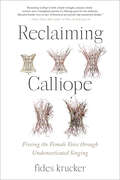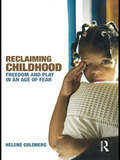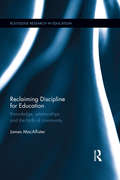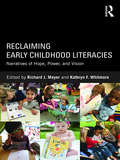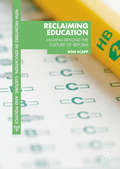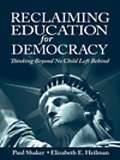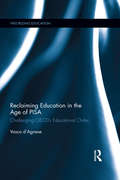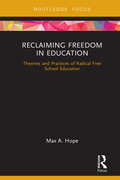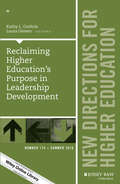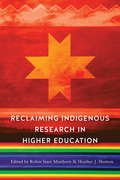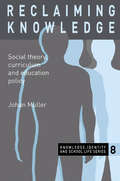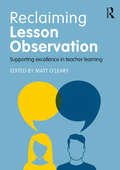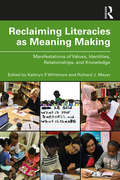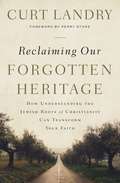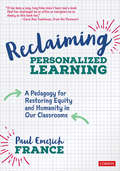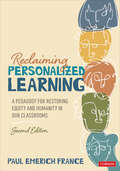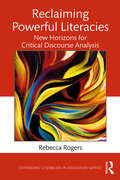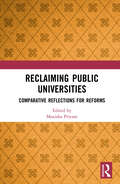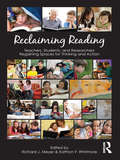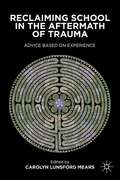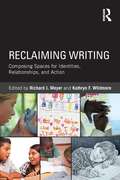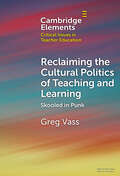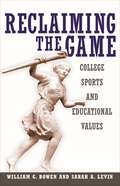- Table View
- List View
Reclaiming Calliope: Freeing the Female Voice through Undomesticated Singing
by Fides KruckerThe practice and politics of the unfettered female voice--reclaiming your power through voice, song, and opera-inspired exercises.For centuries, opera has used women&’s voices to convey male stories. Within an art form dominated by men, the female voice is a means to an end: controlled, denatured, and crafted to carry words and intentions that belie the true depth and complexity of the female experience.Here, author and opera singer Fides Krucker shows readers what it means to find--and use--our authentic voice, to sing wildly and uninhibited from the depths of our bodies and spirits. Part memoir, part radical vocal guide, and part feminist call to action, Reclaiming Calliope offers an intriguing look at the rarified world of opera, with fascinating behind-the-scenes details to which outsiders don&’t typically have access. Through incisive critique, personal stories, and intriguing exposé, Krucker razes the male gaze that packaged characters like Carmen, Tosca, and La Traviota&’s Violetta for viewer consumption--and radically envisions an empowered, new way of finding and fueling the authentic female voice.Through a series of breathing and vocal prompts that anyone--not just singers--can do, Krucker helps readers reconnect to their authentic primal voices: she takes the reader inside her vocal studio to learn new methods of breath, voicework, and embodiment to uncover and access personal and social truths. Each chapter includes a theme-related exercise--an act of expression, release, self-discovery, or resistance--that guides readers to develop voices unbound from anyone else&’s storytelling, boldly and without apology.
Reclaiming Childhood: Freedom and Play in an Age of Fear
by Helene GuldbergChildren are cooped up, passive, apathetic and corrupted by commerce… or so we are told. Reclaiming Childhood confronts the dangerous myths spun about modern childhood. Yes, children today are losing out on many experiences past generations took for granted, but their lives have improved in so many other ways. This book exposes the stark consequences on child development of both our low expectations of fellow human beings and our safety-obsessed culture. Rather than pointing the finger at soft ‘junk’ targets and labelling children as fragile and easily damaged, Helene Guldberg argues that we need to identify what the real problems are – and how much they matter. We need to allow children to grow and flourish, to balance sensible guidance with youthful independence. That means letting children play, experiment and mess around without adults hovering over them. It means giving children the opportunity to develop the resilience that characterises a sane and successful adulthood. Guldberg suggests ways we can work to improve children’s experiences, as well as those of parents, teachers and ‘strangers’ simply by taking a step back from panic and doom-mongering.
Reclaiming Discipline for Education: Knowledge, relationships and the birth of community (Routledge Research in Education)
by James MacAllisterDiscipline is of profound educational importance, both inside educational institutions and outside of them in personal and social life. Reclaiming Discipline for Education revisits neglected philosophical ideas about discipline in education and uses these ideas to re-think practices and discourses of discipline in education today. Chapters in this book trace the evolution of thought regarding discipline in education all the way from Kant through to Durkheim, Foucault, Peters, Dewey and Macmurray. MacAllister also critically examines the strengths and weaknesses of contemporary school discipline practices in the UK, the US and Australia, including behaviour management, zero tolerance and restorative approaches. The educational credentials of psychological constructs of grit and self-discipline are also questioned. This book concludes by considering the current and future state of discipline in education on the basis of the different philosophical, practical and policy perspectives discussed. In particular, MacAllister examines why it is problematic to consider practices of discipline in isolation from the wider purposes of education. This book is suitable for an international audience and should be read by anyone who is interested in education and educational leadership, as well as those interested in the philosophy of education.
Reclaiming Early Childhood Literacies: Narratives of Hope, Power, and Vision
by Kathryn F. Whitmore Richard J. MeyerAt a time when literacy has become more of a political issue than a research or pedagogical one, this volume refocuses attention on work with young children that places them at the center of their literacy worlds. Drawing on robust and growing knowledge which is often marginalized because of political and legislative forces, it explores young children’s literacies as inclusive, redefined, and broadened—encompassing technologies, the arts, multiple modalities, and teaching and learning for democracy, cultural sustainability and social justice. Highlighted themes include children’s rights to grow through playful engagements with multiple literacies to interrogate their worlds; adults who expand and inspire children’s consciousness and awareness of others and the world around them; the centrality of meaning making in all aspects of language and literacy development; a deep respect for diversities, including languages, cultures, sexual orientation, socioeconomic status and more; and an expansive understanding of the nature of texts.
Reclaiming Education
by Ron ScappThis book is an appeal to those directly andindirectly involved in education reform to reconsider the very nature ofeducation as a process of transformation and not, as the neoliberal corporatemodel insists upon, as a "product. " By using Paulo Freire's fundamentalprinciple of understanding "education as the practice of freedom," and expanding upon it with bell hooks' ownspiritual understanding of that principle, this book offers readers theopportunity to rethink what education is, and what it is not. Utilizing the work of diverse thinkers andcritics, the book lays out a criticism of neoliberalism's profound influence oneducation reform and our culture generally. It reaffirms the political andethical import of education for individuals and for our nation as a whole.
Reclaiming Education for Democracy: Thinking Beyond No Child Left Behind (Sociocultural, Political, and Historical Studies in Education)
by Elizabeth E. Heilman Paul ShakerReclaiming Education for Democracy subjects the prophets and doctrines of educational neoliberalism to scrutiny in order to provide a rationale and vision for public education beyond the limits of No Child Left Behind. The authors combine a history of recent education policy with an in- depth analysis of the origins of such policy and its impact on professional educators. The public face of these policies is separated from motives rooted in politics, profit, and ideology. The book also searches for new insights in understanding the neoliberal and managerialist assault on education by examining the psychology of advocates who demonstrate a special animus toward universal public education. The manipulation of public education by No Child Left Behind is a case study in the general approach to public institutions taken by the politicians and theorists in these camps. K-12 education has been subjected to deceptive descriptive analyses, marginalization of its professional leadership, manipulation of its goals, the imposition of illegitimate quality markers, a grab on its resources by corporate profiteers, and a demoralization of its rank and file. This book helps us think beyond this new commonsense of education. Recipient: 2009 AERA Division K Award for Exemplary Research in Teaching and Teacher Education
Reclaiming Education in the Age of PISA: Challenging OECD’s Educational Order (Theorizing Education)
by Vasco d'AgneseReclaiming Education in the Age of PISA provides a critical analysis of the OECD’s educational agenda and its main tool, namely, PISA (Programme for International Student Assessment). Based on an analysis of the OECD’s public documents, including publications, webpages, and videos, d’Agnese argues that PISA is not just an assessment tool, but rather an all-encompassing framework that intends to govern education, schooling, living and society worldwide. This creation of what d’Agnese calls a life-brand raises concerns that education and learning are becoming wares and that, consequently, we run the risk of transforming schools into providers and teachers into agents of preconceived learning packages. In pursuing only one concept of education, and a very narrow one at that, d’Agnese argues that OECD not only narrows down education to a mere reproductive process, but that such an approach also erases the basic rules by which living develops and evolves. In this sense PISA is but another form of authoritarian teaching, authoritarian teaching being understood as any and every educational project which sets aims and purposes of education without giving the possibility to discuss and challenge such aims and purposes. Reclaiming Education in the Age of PISA suggests a different educational logic, emphasizing that schooling is not just a place to produce the correct skills, but is also a matter of experimentation, hesitation and wait, one in which teachers and students attempt to dwell in pure potentiality for growth. Providing a strong argument that a different way to conceive of schooling deserves our attention, this book will be essential reading for academics, researchers and postgraduates in the fields of educational philosophy and theory, inclusive education and social justice. It should also be of interest to policymakers and educational activists.
Reclaiming Freedom in Education: Theories and Practices of Radical Free School Education (Routledge Focus on Education Studies)
by Max A. HopeReclaiming Freedom in Education examines the notion of ‘freedom’ within educational settings. Following an investigation of the new ‘Free Schools’ in the UK, it argues that this name is a misnomer, and instead explores the original free schools of the 1960s and 1970s, using these models as a lens through which to explore contemporary examples of radical schooling, notably those which describe themselves as democratic and/or progressive. By arguing that in radical educational contexts both ‘positive freedom’ and ‘negative freedom’ are apparent, and that the notion that ‘responsible freedom’ is more pertinent than that of ‘absolute freedom’, this book posits that freedom can be seen to operate in a number of ways including ‘freedom to be’, ‘freedom to think’, ‘freedom to choose’ and ‘freedom to self-govern’. The book: Describes how freedom can be used to inform educational structures, policies, pedagogies and practices across a range of settings Features illustrative case studies of radical free schools and alternative education spaces which have been underpinned by a commitment to freedom and to advancing social justice Critiques the current policy agenda to use ‘freedom’ to make education more competitive through claims that it correlates with higher test scores and academic success Considers some of the challenges for teachers, educators and students of offering and experiencing freedom in education, and argues that despite these, the case for advancing freedom is both urgent and compelling Creating discussions about the new meaning and role that ‘freedom’ can have in improving education, Reclaiming Freedom in Education is a practical contribution to educational activism, which will be a key point of reference for teachers, parents, researchers and students on undergraduate and postgraduate courses in Education Studies, Early Childhood Studies and doctorates.
Reclaiming Higher Education's Purpose in Leadership Development: New Directions for Higher Education, Number 174 (J-B HE Single Issue Higher Education)
by Kathy L. Guthrie Laura OsteenGain a greater understanding of leadership-learning programs across disciplines, pedagogies, and departments. This volume focuses on the collective and unique capacity in higher education to leverage and align university resources with leadership learning across college and university initiatives. why we should focus on reclaiming the purpose of higher education and embrace leadership development across disciplines, how we can do this and what this may look like, and how we can assess this has happened. This is the 174th volume of the Jossey-Bass quarterly report series New Directions for Higher Education. Addressed to presidents, vice presidents, deans, and other higher education decision makers on all kinds of campuses, it provides timely information and authoritative advice about major issues and administrative problems confronting every institution.
Reclaiming Indigenous Research in Higher Education
by David Sanders Robin Starr Minthorn Heather J. Shotton Bryan McKinley Brayboy Charlotte Davidson Stephanie Waterman Erin Kahunawai Wright Adrienne Keene Amanda Tachine Sweeney Windchief Theresa Jean Stewart Matthew Van Makomenaw Natalie Rose Youngbull Christine A. Nelson Kaiwipuni Lipe Pearl BrowerIndigenous students remain one of the least represented populations in higher education. They continue to account for only one percent of the total post-secondary student population, and this lack of representation is felt in multiple ways beyond enrollment. Less research money is spent studying Indigenous students, and their interests are often left out of projects that otherwise purport to address diversity in higher education. Recently, Native scholars have started to reclaim research through the development of their own research methodologies and paradigms that are based in tribal knowledge systems and values, and that allow inherent Indigenous knowledge and lived experiences to strengthen the research. Reclaiming Indigenous Research in Higher Education highlights the current scholarship emerging from these scholars of higher education. From understanding how Native American students make their way through school, to tracking tribal college and university transfer students, this book allows Native scholars to take center stage, and shines the light squarely on those least represented among us.
Reclaiming Knowledge: Social Theory, Curriculum and Education Policy (Knowledge, Identity And School Life Ser.)
by Johan MullerReclaiming Knowledge asserts the necessity of a strong view of knowledge for a robust sociology of knowledge, for both researching the curriculum and developing policy. Divided into four sections or investigations, the central question underlying this book is how, in a world of uncertainty and challenge, do we develop a responsible knowledge practice?
Reclaiming Lesson Observation: Supporting excellence in teacher learning
by Matt O'LearyReclaiming Lesson Observation explores the latest practice, thinking and research in lesson observation, putting teacher learning at its heart. Illustrated throughout with practical examples from a range of education settings, each chapter contains a rich variety of state-of-the-art, evidence-based case studies to demonstrate how new approaches to observation can be applied in practice. The book is split into four easily accessible parts: making the transition to ungraded models of lesson observation recent research studies in lesson observation peer observation, coaching and mentoring innovations in observing classroom practice. With a carefully chosen team of contributors, from senior leaders and managers to classroom practitioners and education researchers, this book provides an informed perspective on how to maximise the use of observation, and most importantly, implement proven successful schemes to improve the quality of teaching in the classroom. Reclaiming Lesson Observation is for all practising educators who want to break free from the constraints of performative lesson observation to redefine and reclaim it as a powerful tool for teacher growth, on which to build sustainable, collaborative communities of teacher learning.
Reclaiming Literacies as Meaning Making: Manifestations of Values, Identities, Relationships, and Knowledge
by Kathryn F. WhitmoreWhitmore and Meyer bring together top literacy scholars from around the world to introduce the concept of manifestations: evidence of meaning making in literacy events, practices, processes, products, and thinking. Manifestation are windows into literacy identities, and serve as affective and sociocultural signifiers of learners’ understanding at a point in time and in a specific context. The volume reclaims progressive spaces for understanding reading, writing, drawing, speaking, playing, and other literacies. It grounds manifestations of literacies in the discourse of meaning making and demonstrates how literacy learners and educators are active agents in this complex, social, political, emotional, and multimodal process. Ideal for preservice teachers, graduate students, and researchers in literacy education, this book shifts the conversation away from treating literacies as acquired commodities and illustrates how educators engage with learners to deepen understanding of literacy learners’ experiences. Organized by five pillars of literacy—teaching, learning, language, curriculum, and sociocultural contexts—each section covers critical and cutting-edge topics and offers examples, tools, and strategies for research and practical applications in diverse classroom settings. Each chapter includes a range of examples and is followed by a short, complementary reading extension to engage the reader.
Reclaiming Our Forgotten Heritage: How Understanding the Jewish Roots of Christianity Can Transform Your Faith
by Perry Stone Curt LandryRabbi Curt Landry, founding pastor of House of David Ministries, reveals how understanding the Jewish roots of Christianity leads to a more vibrant, secure, and powerful Christian walk.The church was created by Jesus, who was born Jewish yet primarily rejected by his family and his people. His early followers were both Jewish and gentile, and the church's early culture was rooted in Judaism and a Jewish understanding of God's relationship to his people. Over time, however, Christianity became increasingly more Roman than Jewish, and the church lost its identity.Rabbi Curt Landry's personal story is remarkably similar. Born out of wedlock to a Jewish mother and a Catholic father, Landry was put up for adoption. For over thirty years, he had no understanding of his heritage, his roots, or who his parents were. But when he discovered the truth of his story, his life changed completely.The key to a life of power and purpose is understanding who you are. In this revelatory new book, Curt Landry helps Christians discover their roots in Judaism, empowering them to walk in the revelation of who they really are and who they are born to be. Reclaiming Our Forgotten Heritage reveals the mysteries of the church, letting Christians grasp the power that comes from connecting with their identity.
Reclaiming Personalized Learning: A Pedagogy for Restoring Equity and Humanity in Our Classrooms
by Paul Emerich FranceWhere exactly did personalized learning go so wrong? For teacher and consultant Paul France, at first technology-powered personalized learning seemed like a panacea. But after three years spent at a personalized learning start-up and network of microschools, he soon realized that such corporate-driven individualized learning initiatives do more harm than good, especially among our most vulnerable students. The far-superior alternative? A human-centered pedagogy that prioritizes children over technology. First, let’s be clear: Reclaiming Personalized Learning is not yet-another ed tech book. Instead it’s a user’s guide to restoring equity and humanity to our classrooms and schools through personalization. One part polemical, eleven parts practical, the book describes how to: Shape whole-class instruction, leverage small-group interactions, and nurture a student’s inner-dialogue Cultivate awareness within and among students, and build autonomy and authority Design curriculum with a flexible frame and where exactly the standards fit Humanize assessment and instruction, including the place of responsive teaching Create a sense of belonging, humanize technology integration, and effect socially just teaching and learning—all central issues in equity The truth is this: there’s no one framework, there’s no one tool that makes learning personalized–what personalized learning companies with a vested interest in profits might tempt you to believe. It’s people who personalize learning, and people not technology must be at the center of education. The time is now for all of us teachers to reclaim personalized learning, and this all-important book is our very best resource for getting started. “This is a compelling and critically important book for our time. With rich stories of teaching and learning Paul France considers ways to create the most positive learning experiences possible.” - JO BOALER, Nomellini & Olivier Professor of Education, Stanford Graduate School of Education “This brilliant book is a major contribution to the re-imagination of learning and teaching for the twenty-first century and should be essential reading for new and experienced teachers alike." - TONY WAGNER, Senior Research Fellow, Learning Policy Institute “In these troubled times, this book is more than a breath of fresh air, it is a call to action. Paul gives us an accessible and sophisticated book that explains how and why we should celebrate the humanity of every single student.” - JIM KNIGHT, Senior Partner of the Instructional Coaching Group (ICG) and Author of The Impact Cycle
Reclaiming Personalized Learning: A Pedagogy for Restoring Equity and Humanity in Our Classrooms
by Paul Emerich FranceWhere exactly did personalized learning go so wrong? For teacher and consultant Paul France, at first technology-powered personalized learning seemed like a panacea. But after three years spent at a personalized learning start-up and network of microschools, he soon realized that such corporate-driven individualized learning initiatives do more harm than good, especially among our most vulnerable students. The far-superior alternative? A human-centered pedagogy that prioritizes children over technology. First, let’s be clear: Reclaiming Personalized Learning is not yet-another ed tech book. Instead it’s a user’s guide to restoring equity and humanity to our classrooms and schools through personalization. One part polemical, eleven parts practical, the book describes how to: Shape whole-class instruction, leverage small-group interactions, and nurture a student’s inner-dialogue Cultivate awareness within and among students, and build autonomy and authority Design curriculum with a flexible frame and where exactly the standards fit Humanize assessment and instruction, including the place of responsive teaching Create a sense of belonging, humanize technology integration, and effect socially just teaching and learning—all central issues in equity The truth is this: there’s no one framework, there’s no one tool that makes learning personalized–what personalized learning companies with a vested interest in profits might tempt you to believe. It’s people who personalize learning, and people not technology must be at the center of education. The time is now for all of us teachers to reclaim personalized learning, and this all-important book is our very best resource for getting started. “This is a compelling and critically important book for our time. With rich stories of teaching and learning Paul France considers ways to create the most positive learning experiences possible.” - JO BOALER, Nomellini & Olivier Professor of Education, Stanford Graduate School of Education “This brilliant book is a major contribution to the re-imagination of learning and teaching for the twenty-first century and should be essential reading for new and experienced teachers alike." - TONY WAGNER, Senior Research Fellow, Learning Policy Institute “In these troubled times, this book is more than a breath of fresh air, it is a call to action. Paul gives us an accessible and sophisticated book that explains how and why we should celebrate the humanity of every single student.” - JIM KNIGHT, Senior Partner of the Instructional Coaching Group (ICG) and Author of The Impact Cycle
Reclaiming Personalized Learning: A Pedagogy for Restoring Equity and Humanity in Our Classrooms
by Paul Emerich FrancePut the person back in personalization with a touch of humanity. It’s a paradox: technology to individualize curriculum has made classrooms less personal. Let’s instead trust educators to make learning personal by supporting student agency, self-awareness, and the intimate personal connections found in authentic learning experiences. In the second edition of this groundbreaking book—newly streamlined, and updated with insights from the pandemic—Paul France presents a vision of humanized personalization that rejects the corporate mindset and instead holds equity and inclusion at its center. France leverages over a decade of experience as a National Board Certified Teacher, education consultant, and education technology developer, sharing the following: Practical guidance on designing inclusive learning environments for diverse groups Sustainable applications for humanized personalization in curriculum design, assessment, and instruction Real-life stories from the author’s experience on both sides of the personalization debate A multitude of classroom tools, adaptable to a variety of instructional contexts Nobody understands the need for humanizing education better than teachers. While educators across the country have learned that inundating students with personalized learning technologies is not the way to go, many don’t know how to personalize learning without them. The time to humanize personalized learning and our classrooms is now—and this book will give you a place to start.
Reclaiming Personalized Learning: A Pedagogy for Restoring Equity and Humanity in Our Classrooms
by Paul Emerich FrancePut the person back in personalization with a touch of humanity. It’s a paradox: technology to individualize curriculum has made classrooms less personal. Let’s instead trust educators to make learning personal by supporting student agency, self-awareness, and the intimate personal connections found in authentic learning experiences. In the second edition of this groundbreaking book—newly streamlined, and updated with insights from the pandemic—Paul France presents a vision of humanized personalization that rejects the corporate mindset and instead holds equity and inclusion at its center. France leverages over a decade of experience as a National Board Certified Teacher, education consultant, and education technology developer, sharing the following: Practical guidance on designing inclusive learning environments for diverse groups Sustainable applications for humanized personalization in curriculum design, assessment, and instruction Real-life stories from the author’s experience on both sides of the personalization debate A multitude of classroom tools, adaptable to a variety of instructional contexts Nobody understands the need for humanizing education better than teachers. While educators across the country have learned that inundating students with personalized learning technologies is not the way to go, many don’t know how to personalize learning without them. The time to humanize personalized learning and our classrooms is now—and this book will give you a place to start.
Reclaiming Powerful Literacies: New Horizons for Critical Discourse Analysis (Expanding Literacies in Education)
by Rebecca RogersOffering a unique, reflexive framework for Critical Discourse Analysis focused on discourses of hope, transformation, and liberation, this book showcases a variety of powerful literacies in action. Drawing from original research in a range of public, educational spaces across the lifespan—from Kindergartners studying social justice movements, to sixth graders designing a social justice museum exhibit focused on the environment and sustainability, to teacher education students practicing racial literacy in response to the death of Michael Brown in Ferguson, Missouri—Rogers makes the case that critical social theories often associated with Critical Discourse Analysis have not kept pace with a recent shift toward the positive, referred to as Positive Discourse Analysis. Encouraging readers to reconsider their understanding of concepts such as power, action, context, critique, and reflexivity, this book illustrates the potential of theorizing discourse analysis from a positive orientation.
Reclaiming Public Universities: Comparative Reflections for Reforms
by Manisha PriyamThis book explores the nature of public universities and higher education reforms in emerging economies, with a focus on India, South Africa and Brazil. Drawing on context-based case studies, the essays in the volume highlight the state of public universities amongst the developing world with their shared colonial past and social, caste and race inequalities. Based on comparative and multidisciplinary studies, the book provides a critical account of the policy reforms and changes on account of globalization and markets in higher education in public universities of the Global South regions. The chapters also compare methodological approaches to university reform and restructuring of public universities and higher education systems in USA, Australia, the European Union and India, and examine the California model, the Bologna process, the Melbourne model, the University of Delhi reforms, and engage critically with the New Public Management inspired reform policies. The book further lays the groundwork for understanding 'massification' in a contextual way, and the possibilities for expansion of scale of mass higher education through public provision. With its empirical findings and social theory analyses by global experts, the volume will be of great interest to scholars and researchers of education, higher education, sociology and social anthropology, development studies, public policy and administration, politics, political economy, and Global South studies. It will also be useful to educationists, policymakers and civil society organizations.
Reclaiming Reading: Teachers, Students, and Researchers Regaining Spaces for Thinking and Action
by Richard Meyer Kathryn WhitmoreInviting teachers back to the role of reflective advocates for thoughtful reading instruction, this book presents theory and pedagogical possibilities to reclaim and build upon the knowledge base that was growing when government mandates, scripted commercial programs, and high stakes tests took over as the dominant agenda for reading instruction in U.S. public schools. Focusing on literacy learners’ and their teachers’ lives as literate souls, it examines how the teaching of reading can be reclaimed via an intensive reconsideration of five pillars as central to the teaching and learning of reading: learning, teaching, curriculum, language, and sociocultural contexts. Reclaiming Reading articulates the knowledge base that was marginalized or disrupted by legislated and policy intrusions into classrooms and provides practical examples for taking good reading instruction out of the cracks and moving it back to the center of the classroom. Explaining what happens in readers’ minds as they read and how teachers can design practices to support that process, this book encourages teachers to initiate pedagogy that will help them begin or return to the stance of reflective, knowledgeable, professional decision-makers.
Reclaiming School in the Aftermath of Trauma
by Carolyn Lunsford MearsTeachers in schools where students have experienced trauma face particularly difficult challenges, for how is a teacher to promote academic growth and attainment of educational goals in such a situation? Provides advice, understanding, and proven strategies for meeting the challenges that must be faced after a traumatic experience.
Reclaiming Writing: Composing Spaces for Identities, Relationships, and Actions
by Kathryn F. Whitmore Richard J. MeyerWith passion, clarity, and rich examples, Reclaiming Writing is dedicated to reawakening the journeys that writers take as they make sense of, think about, and speak back to their worlds in this era of high-stakes testing and mandated curricula. Classrooms and out-of-school settings are described and analyzed in exciting and groundbreaking narratives that provide insights into the many possibilities for writing that support writers’ searches for voice, identity, and agency. Offering pedagogical strategies and the knowledge base in which they are grounded, the book looks at writing within various areas of the curriculum and across modes of writing from traditional text-based forums to digital formats. Thematically based sections present the pillars of the volume’s critical transactive theory: learning, teaching, curriculum, language, and sociocultural contexts. Each chapter is complemented by an extension that offers application possibilities for teachers in various settings. Reclaiming Writing emphasizes literacy as a vehicle for exploring, interrogating, challenging, finding self, talking back to power, creating a space in the world, reflecting upon the past, and thinking forward to a more joyful and democratic future.
Reclaiming the Cultural Politics of Teaching and Learning: Skooled in Punk (Elements in Critical Issues in Teacher Education)
by Greg VassDespite often being associated with anti-establishment, irreverent, and a do-it yourself (DIY) rejection of dominant culture, less considered may the collaborative, communal and curative threads of punk thinking, being and doing. From the outset, punk offered critiques and alternative ways of conceptualizing a world and ways of worlding, that aren't as harmful and constraining as those encountered by many in the dominant milieu of life. This monograph is focused on how and why punk can productively contribute to efforts that are responding to the influences of dominant culture in education, such as the effects of standardization, heightened accountabilities, and 'gap talk'. For this Element, punk can be thought of as social practices that generate cultural resources that can be utilized to critique dominant culture. Hence, this Element aims to make the case that punk sensibilities offer educators opportunities to reclaim the cultural politics of teaching and learning.
Reclaiming the Game: College Sports and Educational Values (The William G. Bowen Series #40)
by William G. Bowen Sarah A. LevinIn Reclaiming the Game, William Bowen and Sarah Levin disentangle the admissions and academic experiences of recruited athletes, walk-on athletes, and other students. In a field overwhelmed by reliance on anecdotes, the factual findings are striking--and sobering. Anyone seriously concerned about higher education will find it hard to wish away the evidence that athletic recruitment is problematic even at those schools that do not offer athletic scholarships. Thanks to an expansion of the College and Beyond database that resulted in the highly influential studies The Shape of the River and The Game of Life, the authors are able to analyze in great detail the backgrounds, academic qualifications, and college outcomes of athletes and their classmates at thirty-three academically selective colleges and universities that do not offer athletic scholarships. They show that recruited athletes at these schools are as much as four times more likely to gain admission than are other applicants with similar academic credentials. The data also demonstrate that the typical recruit is substantially more likely to end up in the bottom third of the college class than is either the typical walk-on or the student who does not play college sports. Even more troubling is the dramatic evidence that recruited athletes "underperform:" they do even less well academically than predicted by their test scores and high school grades. Over the last four decades, the athletic-academic divide on elite campuses has widened substantially. This book examines the forces that have been driving this process and presents concrete proposals for reform. At its core, Reclaiming the Game is an argument for re-establishing athletics as a means of fulfilling--instead of undermining--the educational missions of our colleges and universities.
